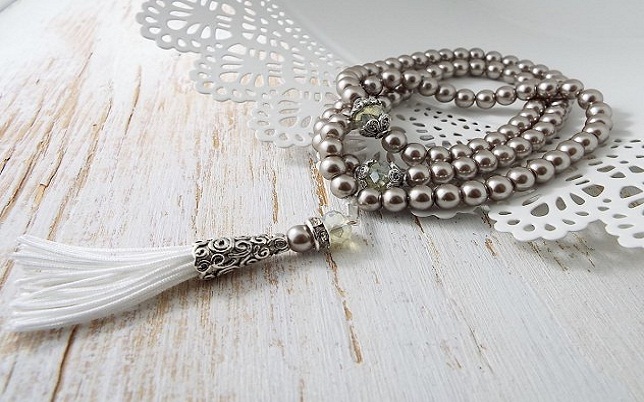In man’s life ultimately comes the inevitable stage of death which spares none; whatever his religion, nationality, or race. We will present here a brief account of the specific attitude, rites and practices with which Muslims deal with this situation.
Muslim’s Concern for Dying in State of Iman (Faith)
A Muslim (even if he has not been a strong adherent to Islamic practices) is very much concerned for meeting death in a good state of Iman, i.e. he wants to leave this world by sincerely affirming his faith in the Oneness of Allah and in Prophet Muhammad as His true and last Prophet.
It is a common tradition among Muslims that they request one another to pray for a death marked with Allah’s favour. Even a common Muslim considers this as the greatest mark of success and truly envies the person who breathes his last with the name of Allah on his tongue.
Reciting Kalma at Death
When a Muslim reaches the last stage of life and is about to depart from the world, his relatives and friends instruct and encourage him to recite the words of the Islamic Faith (“There is no god but Allah and Muhammad is a Prophet of Allah”), or just the name of Allah.
If he is unable to move his tongue then the people present on the scene themselves start reciting the above words or the name of Allah for him. If his tongue is dried, the holy Zamzam water or any other juice is dropped in his mouth. Then the persons present start reciting the Quranic chapter Yaseen to invoke Allah’s blessings for him. When his last moment comes, his face is turned toward the Kaaba in the holy city of Makkah (the direction which he faced all his life in his prayers).
Bathing the Dead and Shroud (Ghusl Mayyat & Kafan)
After the death of a person, preparations for giving him a final bath and shroud (Kafan) begin. For the shroud a new white cloth is used.
For men it consists of an unstitched long shirt, a long piece of cloth for the lower part of the body, and a long sheet to cover the body from above.
For women a piece of cloth to tie her hair and a second short shirt to wear inside the long shirt are added.
The bath to the dead body is given in a certain way (ensuring respectfulness to the dead and full cleanliness to the body). Anybody can wash a dead body, but a person knowledgeable in the procedures followed in this matter is certainly preferred. Relatives and friends eagerly try to participate in doing this last service to the dead and consider it a duty apt to fetch great reward.
Congregational Prayer for the Dead (Salatul Janaza)
When the dead body is ready, properly washed and enshrouded, it is taken out for the final congregational prayer (Salatul Janaza). It is a highly rewarding act in Islam to participate in it. This prayer is congregational, but there is no kneeling (Ruku) or prostration (Sujood) in it. People form rows, preferably in odd numbers, for the prayer to start. Then a religious scholar or any other pious person steps ahead, stands in front of the dead body (facing his chest) and leads the prayer.
Prayer for the Dead (Dua Janaza)
Besides saying other recitations and supplications, the Muslims attending the prayer inaudibly say the following supplication:
O Allah! Forgive from us, the living and the dead, the present and the absent, the male and the female.
O Allah! Whomever You keep alive, keep him alive on Islam, and whomever You want to die, let him die with Faith (Iman).
If the dead body is of a minor boy or girl, a second supplication is also said, which is as follows:
O Allah! Make this child my forerunner (one who goes toward You ahead of me) and my reward and provision in store with You, and one interceding for me on the Day of Judgement and accept his intercession for me.
Carrying the Dead body to the Cemetery
After the prayer is finished, people carry the bier on their shoulders to the cemetery. In Islam, shouldering a bier, carrying it to the cemetery, and staying there until the burial are considered as deeds with great rewards. So Muslims in general eagerly try to shoulder the bier which is thus taken to the cemetery even if the distance is long and the season rough.
Now-a-days in large cities where cemeteries are often far away in the outskirts the bier is taken for burial in a large car or a van. However, leaving an exception for an uncontrollable situation and distance of the cemetery, carrying the bier on shoulders to the cemetery is an Islamic tradition established by the Prophet of Allah (blessings and peace be on him).
Burial Rites of Dead in Islam
The grave is kept ready before the arrival of the dead body at the cemetery. When the dead body arrives, a few persons get down into the grave and with the help of others, carefully take the dead body to the grave and place it there by turning its face toward the direction of Kaaba (which all Muslims face when offering prayers).
Then wooden planks are used to cover the grave above which soil is spread. People participate in putting soil over the grave. At that time the following verse of the Quran is on their tongue:

From this (dust) We created you, and in this we shall put you back, and from this We shall raise you up once again [20:55]
When enough soil is put over the grave and it is given the shape of a grave, the relatives and friends of the deceased stay there further for a short while and pray for the deliverance of the deceased. They recite some portions of the Quran on the occasion, which is a Sunnah (a practice of the Prophet).
Sending Food to the Family of the Deceased
When a person dies in a family, usually the relatives and friends of the family send food for them. This custom is based on the understanding that the family of the deceased may not find it convenient to cook and therefore should be relieved of this task. This is in fact a Sunnah (a practice of the Prophet) intended to share the grief of the family of the deceased which is still followed in the Muslim society. Food is sent for three times or three days, depending on the status of the deceased.

